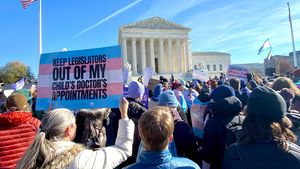The New York Times has come under fire for a crossword puzzle released on the first day of Hanukkah — which was designed in the shape of a swastika.
Instagram account @jewishlivesmatter, which documents instances of anti-Semitism, posted Sunday's crossword puzzle with the caption: "Today's Crossword Puzzle from the @nytimes for Hanukkah is a hidden swastika. Pretty much sums up the @nytimes for the past few years in regard to their opinions on Jews and Israel."
The puzzle was created by consulting manager Ryan McCarty, who wrote in Constructor Notes section that the puzzle was a "fun whirlpool shape.”
“Thrilled to have my first Sunday puzzle in The Times! This grid features one of my favorite open middles that I’ve made as it pulls from a variety of subject areas," he said.
While some commenters have referred to jewlishlivesmatter's post as a "reach," many believe it is too specific to be coincidental. While all crossword puzzles are symmetrical, the shape of the piece coupled with the date of its release — the first night of Hanukkah — is concerning.
The Anti-Defamation League, a Jewish organization that "fights all forms of antisemitism and bias," previously released a report that demonstrated a rise in hate crimes against Jewish individuals and groups. The Department of Homeland security also warned that there is an "enduring threat to faith-based communities," particularly targeting Jewish congregations.
A senior DHS official previously told NBC News that the negative attention put on the Jewish community by public figures and celebrities could be the cause of the increase in violence.
“Certainly the Jewish community seems particularly targeted in recent days by that kind of activity in our discourse," he said.
While LGBTQ+ and minority communities have faced increasing violence and political attacks as of recent, anti-Semitism has been especially prevalent among public figures. Celebrities such as Ye AKA Kanye West, Dave Chappelle, and Kyrie Irving have come under fire for several comments of varying severity.
While Ye has recently openly praised Adolf Hitler and the Nazis, figures such as Irving have engaged in an equally insidious form of dog-whistling, which is defined as "the use of coded or suggestive language in political messaging to garner support from a particular group without provoking opposition."
Through hinting at the widely debunked anti-Semitic conspiracies, actors are able to signal support to white supremacist groups, who would be more likely to pick up on anti-Semitic implications than the rest of the population.
Though it is unclear as to whether The New York Times purposefully designed the crossword puzzle to be in the shape of a swastika, it has happened twice before in 2014 and 2017. The organization then-denied that the shape was created intentionally.
Whether or not it was purposeful, cases such as this can have a chilling effect by acting as a dog-whistles. They send signals to white supremacists that they may have support from within prestigious companies or platforms.
While The Times has yet to comment on the backlash from this puzzle, the discourse has evolved beyond any justification they could give — the whistle has already been blown.
- Hidden Swastika Image in NY Times Crossword Puzzle? - VINnews ›
- The New York Times' crossword puzzle looks like a swastika. Here's ... ›
- New York Times slammed over 'swastika' crossword on first day of ... ›
- NYT publishes crossword puzzle resembling swastika - The ... ›
- 'Disgusting!': 'New York Times' slammed after crossword puzzle ... ›



















































